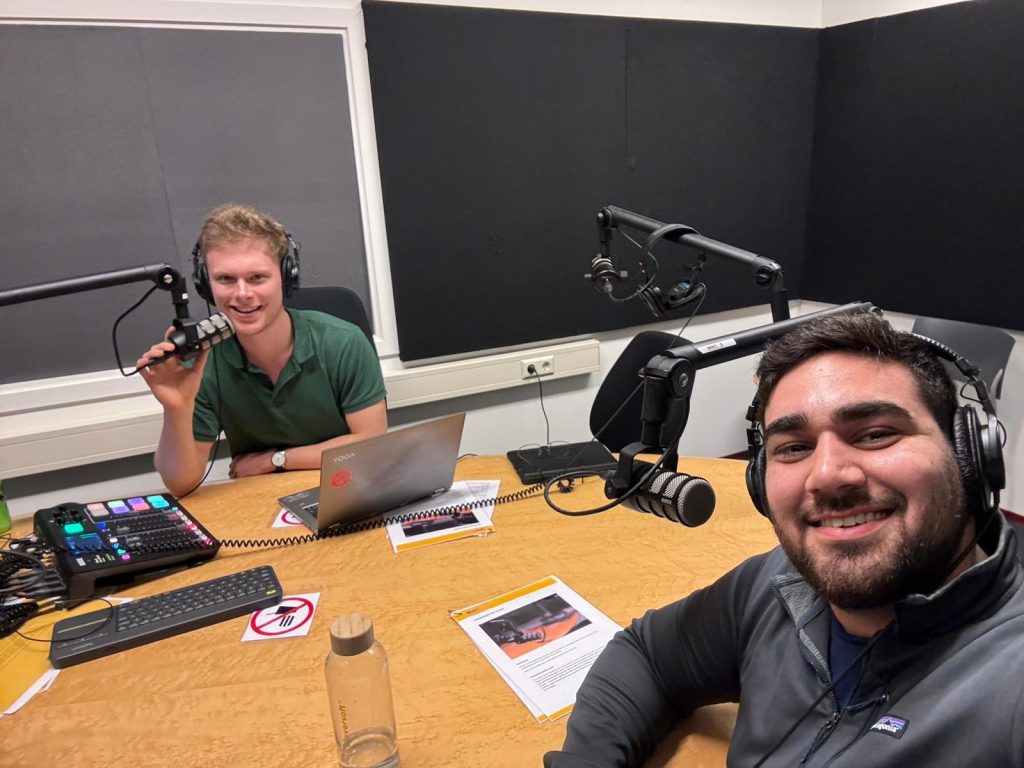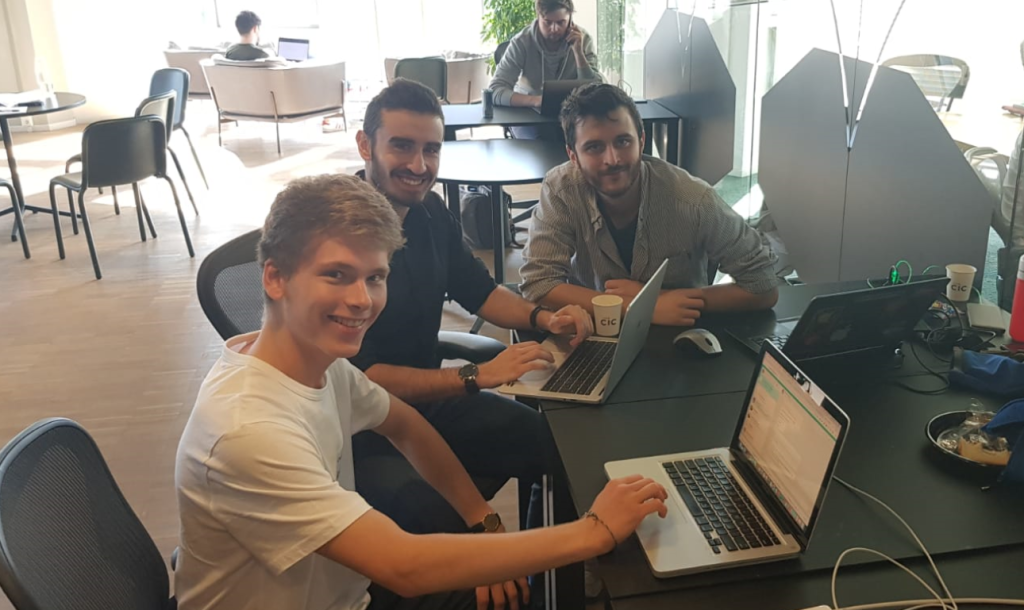Highlighted quote:
Design is part of everything you do when building a company. It’s about understanding the user and tailoring the product to their needs. In the Rotterdam Blockchain Community, I realized people were more interested in networking than the talks. Listening to feedback and iteration based on that is crucial. You need to design for your audience and be open to feedback.
The following article is a summary of my chat with Andres Campo, a serial entrepreneur and a big inspiration for me. We recorded this back in February, so I’m releasing it quite late, but like good wine 🍷 and cheese 🧀, I think it’s aged well. You can listen to it by clicking on the link to the right:
Intro
Olivier: Hey there, and welcome to the userexperience.org podcast, where I interview people about their thoughts and work in the field of user experience. For this episode, I chat with Andres Campo, a serial entrepreneur and a big inspiration for me. We recorded this back in February, so I’m releasing it quite late, but like good wine and cheese, I think it’s aged well.
_________________________________________________________

Today, we have Andres Campo. He is a senior lecturer at the Hogeschool Rotterdam, focusing on design thinking, business design, and digital marketing. He’s also the founder of the Rotterdam Blockchain Community, started in 2017, and Pygma, a startup incubator in Latin America.

Andres is also an angel investor and has founded a new company, Interfas.ai. Andres, could you tell us more about who you are, what drives you, and how you got to where you are today?

Andres: Great to be here, Olivier. Thanks a lot for the invite. I’m excited to be here. When I was hearing what you were saying, I was just thinking back to different stages of my life, focusing on different objectives. I’ve overcome some of those challenges and goals, and now I’m looking forward to what’s next.
I was born in Colombia and left when I was 17 to attend the University of Nebraska in the U.S. I was initially lost about what to study, but someone convinced me to choose supply chain. Although I was passionate about economics and business, I went with supply chain. A lot happened between that decision and today. Eventually, I moved to the Netherlands about seven years ago and have always lived in Rotterdam.
Olivier: I forgot to mention, but we actually met back in 2018 at a startup weekend in Rotterdam, a hackathon where we spent three days starting a company. You were facilitating that. Back then I was 19 and figuring things out, but at that time, you seemed to have figured your things out, but now it really seems that you have it all figured out… I guess you’re just constantly evolving.

Andres: That’s right.
Olivier: So anyways, you mentioned someone advised you to study supply chain. How was that experience?
Andres: I was 17 when I chose my career, which is a tough decision to make. For me, it worked out well. I did my degree in supply chain management and had a minor in international business. I enjoyed the marketing classes more and knew that’s where I wanted to focus. After graduation, I got an internship in Los Angeles with one of the largest distributors of automation and electrical equipment in the U.S., working with clients like Disney and Universal. My role there was in sales and marketing, and I quickly realized I preferred marketing over supply chain.

Olivier: So you decided to transition from supply chain to marketing and entrepreneurship. What were your next steps?
Andres: I had to decide whether to go back to Colombia or try something new. I wanted to go to Europe and found a master’s program in supply chain in the Netherlands. However, I switched to a master’s in consultancy and entrepreneurship last minute, which was the best choice. That led me to Rotterdam in 2017, where I truly fell in love with entrepreneurship and building companies.
Olivier: Was that your first touchpoint with entrepreneurship, or did you have prior interest?
Andres: I had an interest in entrepreneurship, trying to sell candies and phone cases in school, but nothing serious. My first real venture was when I got into cryptocurrencies and started the Rotterdam Blockchain Community. The community focused on bringing speakers and creating a networking space to discuss Bitcoin and blockchain technology.

Olivier: Could you tell me more about the community and what happened to it?
Andres: The community grew a lot, and we had great partnerships with IBM and Erasmus University. However, it was taking a lot of time, and I wasn’t monetizing it properly. One of my first lessons in entrepreneurship was realizing the importance of capturing value back. Despite the momentum, it wasn’t sustainable without proper monetization.
Olivier: How did you design the events and how did you consider the user experience of attendees?
Andres: Design is part of everything you do when building a company. It’s about understanding the user and tailoring the product to their needs. In the Rotterdam Blockchain Community, I realized people were more interested in networking than the talks. Listening to feedback and iterating based on that is crucial. You need to design for your audience and be open to feedback.
Olivier: How did you handle the challenges of realizing people weren’t interested in the talks?
Andres: Initially, it was frustrating, but I learned that it’s not about people appreciating your effort. It’s your responsibility to build something they want. It took time to realize this, but it’s crucial for any founder to understand that the user’s needs come first.
Olivier: Moving towards your future, you also participated in an incubation program and built an edtech startup. Tell us about it.
Andres: The idea was to monetize the Rotterdam Blockchain Community by building an edtech startup. I built BuildupCamp, an edtech company offering web development and blockchain training. However, I lost my co-founder, the technical person, and had to pivot. That’s when I truly fell in love with startups and building, being surrounded by energetic people.
Olivier: Being an entrepreneur is mentally and physically draining. How do you prevent burnout?
Andres: Burnout is inevitable in startups, but it’s not just about overworking. Burnout happens when you do things you don’t enjoy. If you are passionate about what you do, you won’t feel burned out. However, hustle culture isn’t healthy. Quality work and proper rest are essential for success.

Olivier: What happened after BuildUp camp?
Andres: After losing my co-founder at BuildUp camp, I pivoted to building a remote incubation program. However, I made the mistake of focusing on building supporting products instead of the actual incubation program. I eventually paused buildup camp due to the COVID-19 pandemic.
Olivier: What did you do during the 6-month discovery period?
Andres: During a 6-month discovery period, I read extensively about product design and product management, taking courses and educating myself. This led me to realize someone else was building a remote incubator, which motivated me to revive buildup camp.

Olivier: How did you structure the revived BuildUp camp program?
Andres: I launched a boot camp program where early-stage founders paid 700 euros to learn skills like product design, prototyping, and value proposition design. I ran 5 iterations of this program before deciding to shut it down due to lack of traction.
Olivier: How did the BuildUp camp program then evolve into Pygma?
Andres: After shutting down BuildUp camp, I connected with someone in Colombia who was building a similar business. We decided to merge our efforts, leading to the creation of Pygma – an acceleration program focused on the full spectrum of building a startup, including product, operations, culture, venture capital, marketing, and growth.
Olivier: How did you approach designing the Pygma program?
Andres: I treated the Pygma acceleration program as a product, using design thinking and business design principles. This involved interviewing people, building prototypes, getting feedback, and iterating. I also focused on building a robust network of VCs and angels to support the startups in the program.
Olivier: What led to your departure from Pygma?
Andres: After two years of working long hours across time zones, I started to feel burned out. I also had a different vision for Pygma’s global expansion compared to my co-founders, which led to disagreements. Ultimately, I left Pygma on good terms as an advisor, allowing the team to move forward with their more conservative approach.
Olivier: What inspired your next venture, Interfas.ai?
Andres: During my time off after leaving Pygma, I had an idea to use AI and language models to simulate A/B testing and provide product improvement recommendations to companies, without them having to run their own experiments. I started building this idea, Interfas.ai, in January 2023 with a technical co-founder.

Olivier: How are you balancing product development and customer discovery for Interfas.ai?
Andres: With a strong product and design focus, I am prioritizing customer discovery calls and mockup creation, while my co-founder handles the technical implementation. I have learned from past experiences to avoid distractions and focus on validating the product and getting sales.
Olivier: Amazing, thanks for your time and for insights
Andres: My pleasure, thanks for having me on.

Leave a Reply